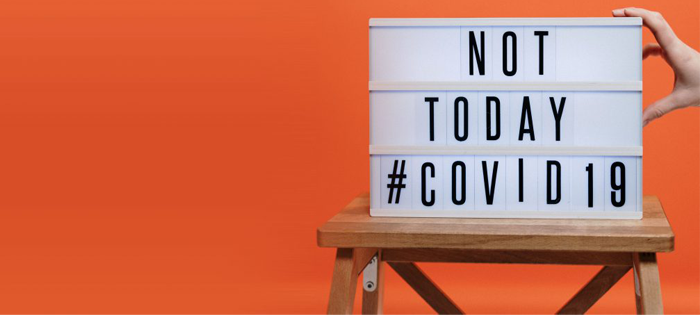Life during a pandemic: how to protect and survive?
There has never been such a spring as in 2021 in the world. Self-isolation and restriction of movement are accompanied by alarming news of an increase in the number of cases and intractable symptoms of coronavirus infection. All this, as expected, made people more attentive to their health and hygiene issues. Now more and more often one can hear the opinion that the coronavirus pandemic will change our lives forever. In this article, we will talk about what kind of changes they will be and whether there is at least something good in them, as well as how to make your home virus-proof.

The world will not be the same - a pretentious phrase, which in many respects and unfortunately reflects the realities.
But let's think about what habits acquired during the coronavirus pandemic would you recommend to leave for good?
I think that my recommendations are unlikely to change anything, but, I repeat, it seems to me that people should be more collected when it comes to health protection. And if this habit persists, it will be good. You have to be able to pay attention to the little things. It is generally useful for social life. You see, two ingrained habits are important to human society: discipline and obedience. These are two different things. Our population, it seems to me, is obedient and undisciplined.
That is, they declared self-isolation - and everyone went to a barbecue. The state tells us something, but we kind of ignore it.
Regarding the virus: it is a devastating and terrible disease, but the World Health Organization (WHO) recently discussed the topic of completely eradicating the smallpox virus. Indeed, it can be considered (simplifying) that he disappeared.
So an epidemic with a mass of defeats is a completely normal and natural thing. And then the virus disappears somewhere. This shouldn't come as a surprise.
How to protect yourself from a terrible infection?
Everyone knows that any viral pneumonia is accompanied by the development of bacterial infections. I have heard (I can neither deny nor confirm this) that the Spanish flu was accompanied by the development of a particularly vicious bacterial lung infection. Now all this is difficult to verify, but we will consider it a working hypothesis. It could be so. Such a comparison may be correct.
A person should be collected, focused on his loved ones, on his development, and even in a difficult situation, one should observe balance in judgments, reposts, anxiety, and so on.
Country-wide regulations impact your personal safety
Those measures where the government relies more on citizens. Self-restraint, self-isolation - all these words imply that people themselves must realize that they need to limit their contacts since such a danger has begun. A cognitive limitation of contact with increased masses of people can qualitatively affect the improvement of the viral situation.
Will self-isolation have a positive effect on the situation with other diseases?
To be honest, the only positive effect is reducing the chances of contracting other pathogens. But this can also negatively affect planned examinations, operations, sometimes vital events. The fact is that now the health care system is connected with this situation and everything is aimed at fighting the coronavirus. Accordingly, someone will not get the help they need.
In general, this notorious "social distance", which is being talked about everywhere now, washing hands - will it really make our world a better place? Will people get sick less if habits remain in some form after the coronavirus? Or will the coronavirus go away and old habits return?
I think the old habits will return, but not quite. Still, the memory of this in society remains. And, perhaps, they will suffer less from some diseases. I think, to a more significant extent, this applies to Italy, where people are very emotional, actively contact each other, hug, and certainly kiss when they meet. You must agree that this is not accepted in our country.
How to reliably protect your home from the coronavirus?
There are more fears than real threats and measures taken to protect against 2019-nCoV. Meanwhile, you can try to defend yourself, but you need to protect yourself from the virus not only in the external environment but also at home: housing can become a source of infection, even if there have never been patients in it.
It is recommended, of course, not to travel to the focus of the disease, to avoid attending public events, wash your hands more often and use protective masks. Not a word about measures to protect residential and office spaces. Meanwhile, elevators, which are in both offices and residential buildings, have already been named the most dangerous place for coronavirus infection.
You can get infected even when you are driving alone - outside the human body, 2019-nCoV survives for up to two days on dry surfaces, and even longer in liquid media. The main source of infection is the buttons in the elevator. They should not be touched with bare hands.
Another danger in residential buildings is the possibility of spreading the virus through the same ventilation. In early February, it became known that 2019-nCov can be transmitted by fecal matter, and not just by airborne droplets. 2019-nCov has a lot in common with SARS, the coronavirus that triggered the SARS epidemic in China in the early 2000s. Stool transmission of SARS has infected hundreds of people in a Hong Kong apartment complex. The flow of "bad" air from the bathrooms got into several apartments, and then with the help of the wind - into the neighboring buildings of the complex. About 300 people fell ill. Later, the authorities revealed serious errors in the design of the drainage system of the complex.
In 2021, the situation is repeated in another residential building in Hong Kong - on the night of February 11, more than a hundred tenants had to be evacuated from it, occupying apartments with the number 7 in the rooms - they all have a single ventilation system in bathrooms and toilets. In the high-rise building, there are two 2019-nCov infected - in 307 and 1307 apartments, but the authorities do not want to wait for the appearance of new patients.
in the absence of a mask, cover the bottom of the face with a scarf, do not ride in elevators, in transport, stay at the front door so that viruses are not blown off from those in front, do not kiss, refuse to shake hands, rinse your nose with water and hydrogen peroxide (with garlic, salt, chamomile - options a lot), stop eating meat.
conduct an audit of ventilation systems, as well as regularly ventilate living quarters. In addition, you need to wash the floors more often with disinfectants, when visiting other places, especially public ones, have antiseptics for furniture, floors and walls with you. It is necessary to keep immunomodulators and antipyretics in the home first-aid kit, in order to prevent eating vitamin C and foods enriched with this vitamin.
Protecting your own home from Covid 2019
To prevent the "visit" of the coronavirus in the apartment can regularly supply fresh air to the living quarters and wet cleaning. Consider setting up natural ventilation more often, wash the floor more often, install a humidifier, an air purifier. A humidifier also significantly reduces the risk of disease. In a central heating environment, buying a humidifier solves a huge number of health issues. Cleanse your nose with saline solutions, which can be purchased from the pharmacy along with flushing devices. There is no need to sit in an apartment with completely sealed windows: the influx of fresh air, humidity, and coolness will contribute to the death of viruses.
Take vitamins D and C. They both help resist the probability of you falling ill. Attention, 2019-nCoV infection occurs through direct or very close contact with a patient who has an officially confirmed diagnosis. Accordingly, in order to become infected with a coronavirus, there must be a history of contact with a carrier of a confirmed diagnosis.
Putting on personal protection masks is an ineffective manipulation, under the mask the microflora reproduces perfectly in conditions of breathing, humid and warm, therefore the mask is not an effective method of prevention. If you live in the same area with an acute viral infection, then it is not at all necessary that you get sick - it basically all depends on your immunity. It largely depends on how much you have filled all the deficiencies and what happens to your body: the most important thing is that you have a sufficient level of vitamin D, and that there is no anemia. People prone to iron deficiency anemia who are deficient in vitamin D get sick much faster and more severely.
The main and, it seems, the most effective advice to date to protect against coronavirus is the recommendation to wash your hands after visiting public institutions, toilets, before eating, returning from the street.
Immunologists advise carrying out a general cleaning during the quarantine period in order to rid the house of unnecessary things. So there will be more space in the apartment, and less things that accumulate dust.

